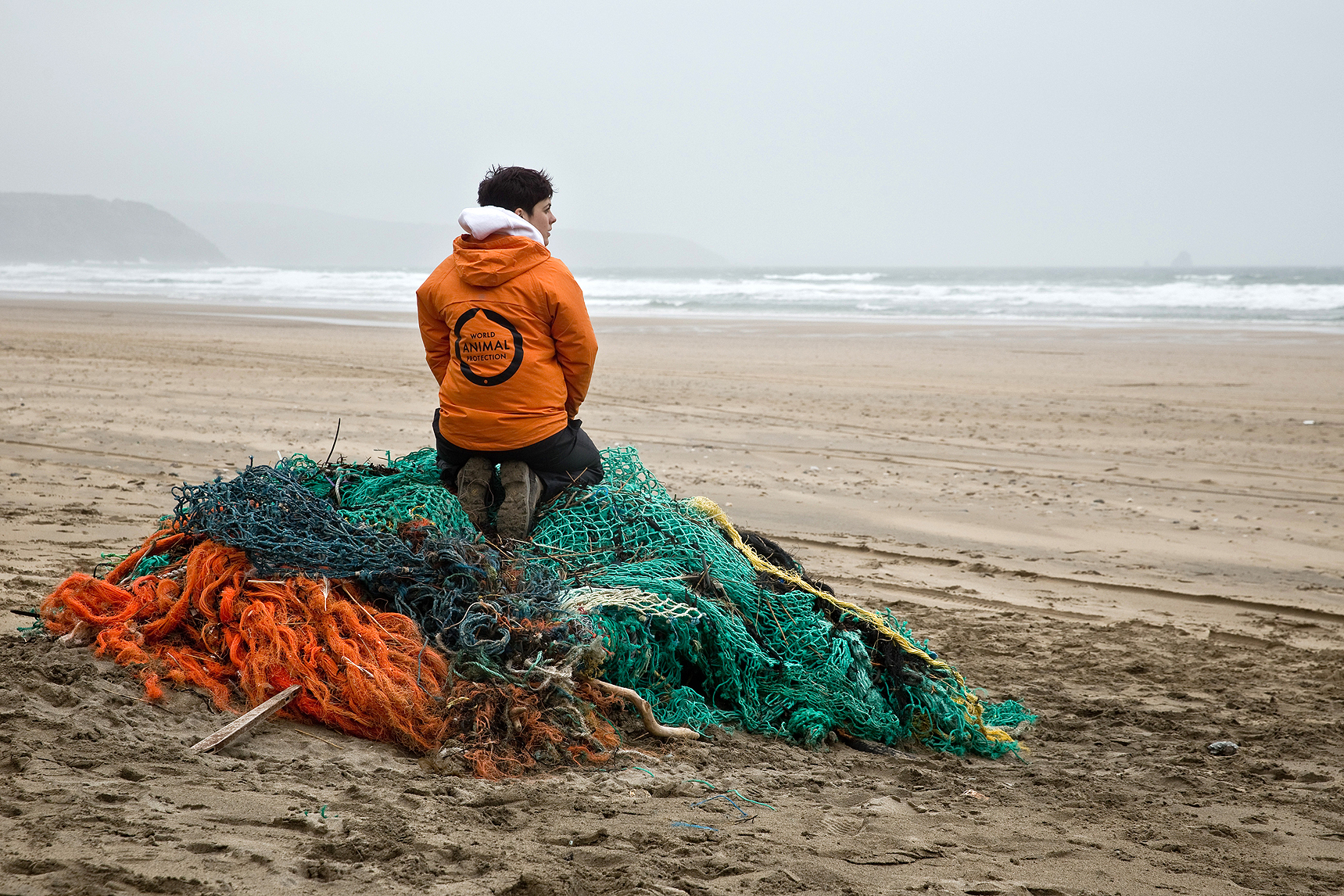Into The Industry: Oceans Campaigner
Rebecca Daniel
This week we caught up with campaigner, bass guitarist, and lover of roller derby, Christina Dixon. Find out how shes successfully protecting what she loves by educating others about ghost fishing nets...
Photo: Chris Dixon
Hey Chris! Tell us a bit about yourself.
My name is Chris Dixon, I’m 32 years old and work as Global Campaign Manager for World Animal Protection’s Sea Change campaign, as well as co-coordinator of the Global Ghost Gear Initiative’s ‘’solutions working group’’. I am mainly found visiting project sites in places like Indonesia and Vanuatu or speaking at events around the world on things like the circular economy of fishing gear and best practices for fishing gear management. Outside of my oceans work I play roller derby and the bass guitar while living in Brixton, London.
So you're campaigning to protect our ocean, what initially made you fall in love with it?
From a young age I’ve loved swimming in the sea. I was incredibly lucky that growing up my parents had a holiday home in Menorca and I was tossed in the sea regularly. I used to spend hours with a snorkel in the bay near our house studying the fish and floating around. My dad’s side of the family also live on the South Coast of the UK so I’ve got a lot of happy memories walking along the pebble beaches near Bognor Regis and sitting in windy beach side cafes. The ocean has always been a place where I’ve found comfort and the old cliché is true – you always end up protecting what you love.
How did you get into your current profession?
After university I got into campaigns and worked for another organisation on animal welfare issues. When I moved to World Animal Protection I was working across all our campaigns but it just so happened that on the first day of my new job they needed someone to attend a workshop on our future oceans work. I was the designated person who went along to find out more and I was hooked on our campaign from that moment onwards. I didn’t do any particular studies that led me to work on oceans specifically, I actually studied broadcast journalism for my undergraduate and media and communications for my postgraduate, but I think those things are interlinked because at the crux there’s an interest in storytelling, truth-seeking and communicating with new audiences, which is what led me to campaigning work.
What kind of work is World Animal Protection doing?
As an organisation we work across a number of programmatic areas including wildlife, farming, animals in communities and animals in disasters. I work within the wildlife team alongside an inspirational bunch of people covering everything from traditional medicine to animals in tourism. Our oceans team is fairly small (but mighty!) and is focussed solely on our campaign to combat the issue of abandoned, lost and otherwise discarded fishing gear. We’re an animal welfare organisation so that is always at the heart of what we do.
Tell me a little bit about your latest campaign - Sea Change.
Our Sea Change campaign has been running for a number of years and the goal is to protect animals from the harm caused by what is known as ‘ghost gear’ – basically nets, ropes, traps and lines that are floating in the ocean and can entangle animals or even be ingested. I’m sure by now most people have seen the images of whales with stomachs full of fishing gear or turtles caught in floating nets – it’s a huge problem in our oceans and the deadliest form of marine debris.
Although our interest was originally from an animal welfare perspective, the impacts of ghost gear span far beyond that and pose a threat to sustainable fisheries, livelihoods and ultimately food security as well as the broader marine environment. For that reason we work collaboratively with governments, industry and other NGOs through an alliance we launched called the Global Ghost Gear Initiative, which is leading some amazing work to build evidence globally about the impacts of ghost gear, to work on industry-led solutions to prevent more gear ending up at sea and also on solution projects aimed at removal, recycling of old nets and other preventative measures.
Photo: Chris Dixon
Give me an example of a ocean campaign success story, and what you managed to achieve.
There are the little successes which I’ve been a part of, for example beach and dive clean ups where we’ve hauled gear out of the water and directly made a difference for people and animals in that area, but I think overall the biggest ocean campaign success story for World Animal Protection has been launching the Global Ghost Gear Initiative. We started out in 2014 working on what seemed to be quite a niche issue. A lot of people didn’t know what ghost gear was or why they should care, but my team had a dream to try and bring together the first global, multi-stakeholder alliance dedicated to tackling ghost gear and put it onto the global agenda and now here we are with 12 governments joined up and over 70 participant organisations. Collectively we’ve been able to deliver some ground-breaking pieces of work – the first global data portal collating information about trends and abundances of ghost gear globally, the ‘best practice framework for the management of fishing gear’ which is a toolkit for the industry and other people in the seafood supply chain to directly address the risk of ghost gear in their operations, and dozens of solutions projects focussed on reducing and removing ghost gear around the world. In three years of operation we’ve grown so much and there’s now a strong foundation for continued action on ghost gear.
Photo: Chris Dixon
What does a day in your life look like?
I’m lucky that my days are hugely varied. I manage a couple of projects around the world and I’m often involved in developing new projects, so generally I’m away from my desk at workshops or visiting site locations, making new contacts and gathering content to support our work. I also do a lot of advocacy work so I spend time meeting with companies and governments discussing areas of collaboration, funding for projects and upcoming policy developments where we may be able to work together. I generally spend time ‘spreading the word’ when I’m not busy on project work, so that can be writing blogs, speaking at conferences, working with our media team to promote stories about ghost gear, writing papers and coordinating working groups related to my work.
What can people do to support your cause?
I encourage organisations to join the Global Ghost Gear Initiative and help us make a difference on ghost gear. Also, as individuals you can help by collecting and sharing data on ghost gear, removing ghost gear where you see it and spreading the word that we need ghost gear free seas. I’d also recommend you to write to supermarkets and companies who are connected with the oceans, for example through selling fish, to join up to the GGGI and implement best practices for preventing ghost gear in their operations. Finally, World Animal Protection is funded by people like you, so we always welcome donations to continue our work.
What advice would you give to people who want to get into this career?
There isn’t really a clear path to becoming an oceans campaigner, so I would say that keeping passionate, volunteering and developing transferable skills will be the key tools to get where you want to be. Campaigning is a really interesting and rewarding career but it’s also incredibly hard work because you’re surrounded by passionate people who want to do the best for their cause. I’d recommend spending time volunteering in organisations of different size and with different approaches to find out what you like and don’t be afraid to take on all the little jobs that make the whole thing a success.



